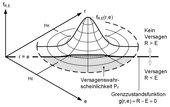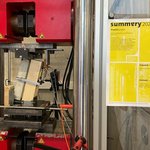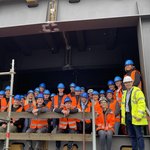Prof. Dr.-Ing. Matthias Kraus
Welcome to steel, timber and hybrid structures!
The Chair focuses on the analysis, dimensioning and structural design of steel, hybrid and timber structures and specializes in analytical, numerical and experimental research. This includes the development and application of computer-oriented methods and simulations of load-bearing structures under complex loading conditions.
Below you will find current news from the Chair, funded third-party projects and open topics for theses. Information on the team, research, publications and teaching can be found on the corresponding subpages.
Below you will find an overview of the third-party funded projects of the Chair of Steel and Hybrid Structures since 2015. Further information and contact persons for the projects can be found on the respective project pages.

Projektart: Deutsche Forschungsgemeinschaft (DFG), Sachbeihilfe / Förderdauer: 2025 - 2028
Weitere Informationen finden Sie hier.
Project type: Thuringian Ministry of Economic Affairs, Science and Digital Society (TMWWDG) / European Union (ERDF) / Thüringer Aufbaubank / Funding period: 2024 - 2026
Further information can be found here.

Project type: FTI Thuringia 2021 - 2027, Ministry of Economic Affairs, Science and Digital Society Thuringia
Funding period: 2023 - 2025
Further information can be found hier.

Project type: German Research Foundation (DFG), grant
Funding period: 2023 - 2026
Further information can be found hier.

Project type: Federal Ministry of Economics and Climate Protection (BMWK), Forschungsvereinigung Stahlanwendung e.V. (FOSTA), AIF-IGF project
Funding period: 2022 - 2024
Further information can be found hier.

Project type: Federal Ministry of Food and Agriculture (BMEL), Fachagentur Nachwachsende Rohstoffe e.V. in the "Renewable Resources" funding program.
Funding period: 2022 - 2025
Further information can be found hier.
![[Translate to English:] Foto: Professur Stahl- und Hybridbau, Bauhaus-Universität Weimar.](/fileadmin/_processed_/1/8/csm_HeriTech_34182d9f97.jpg)
Project type: Thuringian Ministry of Economics, Science and Digital Society (TMWWDG) - State program ProDigital.
Funding period: 2020 - 2024
Further information can be found hier.
![[Translate to English:] Foto: Professur Stahl- und Hybridbau, Bauhaus-Universität Weimar.](/fileadmin/_processed_/f/e/csm_Klimawandel_e23b26270f.jpg)
Project type: Thuringian Ministry of Economics, Science and Digital Society (TMWWDG) / European Union (ESF) / Thüringer Aufbaubank
Funding period: 2020 - 2022
Further information can be found hier.
![[Translate to English:] Foto: Professur Stahl- und Hybridbau, Bauhaus-Universität Weimar.](/fileadmin/_processed_/e/8/csm_Intelligente-Bauwerke_e8107dddc4.jpg)
Project type: German Research Foundation (DFG), grant.
Funding period: 2018 - 2022
Further information can be found here. hier.
![[Translate to English:] Foto: Professur Stahl- und Hybridbau, Bauhaus-Universität Weimar.](/fileadmin/_processed_/e/7/csm_HyGlas_f9d38bca1d.jpg)
Project type: Federal Ministry for Economic Affairs and Energy (BMWi) / AiF - Central Innovation Program for SMEs (ZIM).
Funding period: 2019 - 2021
Further information can be found hier.

Project type: Thuringian Ministry of Economic Affairs, Science and Digital Society (TMWWDG) / European Union (ERDF) / Thüringer Aufbaubank.
Funding period: 2020 - 2021
Further information can be found hier.
![[Translate to English:] Foto: Professur Stahl- und Hybridbau, Bauhaus-Universität Weimar.](/fileadmin/_processed_/b/7/csm_Digitale-Stra___fe_0161af8a64.jpg)
Project type: Thuringian Ministry of Economic Affairs, Science and Digital Society (TMWWDG) / European Union (ESF) / Thüringer Aufbaubank
Funding period: 2018 - 2020
Further information can be found hier.

Project type: BAST research contract
Funding period: 2018 - 2019
Further information can be found hier.
![[Translate to English:] Foto: Professur Stahl- und Hybridbau, Bauhaus-Universität Weimar.](/fileadmin/_processed_/f/9/csm_Messeinrichtung_2a15c6c28c.jpg)
Project type: Thuringian Ministry of Economic Affairs, Science and Digital Society (TMWWDG) / European Union (ERDF) / Thüringer Aufbaubank
Funding period: 2017 - 2018
Further information can be found hier.

Project type: European Commission, Horizon 2020
Funding period: 2015 - 2017
Further information can be found hier.
The Chair of Steel and Hybrid Structures is currently supervising student projects (Master's, Bachelor's and student research projects) focusing on the following topics.
Have we caught your attention? Please feel free to contact us!
Additive Fertigung im Stahlbau
Künftig werden Bauteile aus dem 3D-Drucker auch im Bauwesen Einzug halten. Über das Stabilitätsverhalten solcher additiv gefertigter Komponenten ist jedoch noch nicht viel bekannt. Die Arbeiten auf diesem Themengebiet beschäftigen sich mit z. B. den Materialeigenschaften, Auswirkungen von Imperfektionen auf das Stabilitätsverhalten; Ermittlung thermischer Eigenspannung, strukturmechanischer Simulationen sowie weitere Untersuchungen verschiedener Aspekte additiv gefertigter Bauteile.
Ansprechpartner:
Caridad Moscoso (caridad.moscoso[at]uni-weimar.de)
Fassadensysteme und deren Verbindungstechniken
Innerhalb von Forschungsprojekten zum Themenkomplex des Fassadenbaus ist zu den Schwerpunkten Konstruktiver Glasbau und Verbindungstechniken die Ausarbeitung von Aufgabenstellungen für Studienarbeiten/Abschlussarbeiten gegeben. Möglichkeiten des experimentellen Arbeitens, Durchführen von Literaturrecherchen sowie Numerischen Untersuchungen (Strömungssimulationen) sind gegeben. Konkrete Themen werden nach Anfrage ausgearbeitet.
Ansprechpartnerin:
Christin Sirtl (christin.sirtl[at]uni-weimar.de)
Hybride Holzbrücken mit Klebverbund
Ziel eines aktuellen Forschungsschwerpunktes ist es, die Holz-Beton-Verbundbauweise (HBV-Bauweise) mit Klebverbund für den Brückenbau zu etablieren. Im Fokus stehen u. a. die Erforschung des Verbundtragverhaltens unter Langzeitbeanspruchung infolge mechanischer und wechselnder thermischer Beanspruchung sowie die Entwicklung des optimalen Klebfugendesigns und einer robusten Herstellungstechnologie. Basierend auf experimentellen Untersuchungen mit integrierter Sensorik werden numerische Simulationsmethoden und Ingenieurmodelle kalibriert und weiterentwickelt, um Prognosen zum Langzeittragverhalten des Verbundes sowie Parameterstudien zum Gesamttragverhalten durchzuführen. Konkrete Themen mit inhaltlichem Bezug zum Forschungsvorhaben werden nach Anfrage ausgearbeitet.
Ansprechpartner:
Martin Kästner (martin.kaestner[at]uni-weimar.de)
Holzbau / Bambus-Bau / Nachhaltige Bauweisen
Der Einsatz von Holz und anderen nachwachsenden Rohstoffen als Baumaterialien nimmt aufgrund umweltpolitischer und baurechtlicher Veränderungen, bautechnischer Entwicklungen sowie sich wandelnder Nutzerinteressen stetig zu. Fehlende wissenschaftliche Untersuchungen und normative Regelungen schränken in dieser dynamischen Entwicklung oft die Anwendungsmöglichkeiten im Bauwesen ein. Nachfolgend sind einige Themenbereiche genannt, zu denen konkrete Aufgabenstellungen nach Anfrage ausgearbeitet werden können:
- Vergleich von bestehenden und neuen Konzepten/normativen Regelungen für ausgewählte Tragfähigkeits- und Gebrauchstauglichkeitsnachweise des Holzbaus
- Ermüdungsnachweise im Holzbau
- Kriech-/Relaxationsverhalten von Holz bei Schubbeanspruchung
- Untersuchungen zur Bewertung der Tragfähigkeit und der Klebfugenfestigkeit von historischem Brettschichtholz
- Bambus-Bau (z.B. Literaturrecherchen, Stabilitätsuntersuchungen (FE-Analysen, experimentelle Untersuchungen), Modellierung von Imperfektionen, 3D-Scans der Bambusgeometrie, Untersuchungen zu Verbindungstechniken, Design und Konzeption von Bambushäusern und -brücken)
Ansprechpartner:
Martin Kästner (martin.kaestner[at]uni-weimar.de)
Henrieke Fritz (henrieke.fritz[at]uni-weimar.de)
Probabilistische Tragwerksanalysen unter Berücksichtigung von Instationaritäten
Im Rahmen probabilistischer Tragwerksanalysen sollen speziell unter Berücksichtigung zeitabhängiger Lasten bzw. Widerstände Zuverlässigkeits-, Sensitivitäts- und Variationsanalysen durchgeführt werden. In diesem Zusammenhang besteht weiterhin der Bedarf an neuen und effizienten Methoden, die insbesondere Instationaritäten in Datenreihen abbilden und bewerten lassen. (Studienarbeit/Masterarbeit)
Ansprechpartner:
Robert Arnold (robert.arnold[at]uni-weimar.de )
Programmentwicklung für den Stahl-, Verbund- und Hybridbau
Programmentwicklung für verschiedene Problemstellungen unter der Prämisse der einfachen Bereitstellung durch tabellenkalkulationsbasierende VBA-Programmierungen.
Ansprechpartner:
Robert Arnold (robert.arnold[at]uni-weimar.de )
Program development in the area of steel and hybrid structures, finite elements, and structural design
Development of software for solving diverse problems of finite elements and structural design in the steel field. The programming languages are C#, Matlab, and Ansys APDL commands.
Contact:
Stalin Ibáñez (stalin.patricio.ibanez.sanchez[at]uni-weimar.de)
Stabilitätsanalysen im Stahlbau
Untersuchungen zu den Stabilitätsfällen Biegeknicken, Biegedrillknicken und Plattenbeulen von Stahlbauteilen und Stahltragwerken (geometrische Nichtlinearität bzw. Theorie II. Ordnung sowie physikalische Nichtlinearität). Aufgabenstellungen können nach Anfrage u.a. zu folgenden Themen ausgearbeitet werden:
- Einfluss von tatsächlich gemessenen geometrischen und materiellen Imperfektionen auf das Stabilitätsverhalten von Stahlträgern und plattenartigen Stahlbauteilen
- Geometrieaufnahme von Stahlträgern: Auswertung der Qualität von photogrammetrischen Aufnahmemethoden mit verschiedenen Kameraaufbauten und –parametern
- Parameterstudien auf Grundlage von geometrisch und materiell nichtlinearen Analysen unter Berücksichtigung von Imperfektionen (GMNIA) für die Bewertung unterschiedlicher Ansätze zur Modellierung geometrischer und materieller Imperfektionen
Ansprechpartnerin:
Caridad Moscoso (caridad.moscoso[at]uni-weimar.de )
Plattenbeulen: Robert Arnold (robert.arnold[at]uni-weimar.de)
Structural life cycle assessment
Structural life cycle assessment of new and existing structures is the dominant research field that requires efficient numerical modelling, structural health monitoring, and data analysis. Within this scope, the following fields are primarily suggested, but not limited to:
- Fatigue analysis of metal structures (stress-based method, strain-based method, damage tolerant method, with national standards)
- Life cycle assessment with the aid of structural health monitoring - SHM (data analysis with frequentist and Bayesian approach)
- Program development to aid fatigue analysis and SHM
- Finite element modelling of structural details (Ansys mechanical APDL)
Contact:
Sharmista Chowdhury (sharmistha.chowdhury[at]uni-weimar.de)
Uncertainty evaluation of structural modelling
Evaluation of uncertainties in finite element modelling considering different element types and modelling theories.
Contact:
Stalin Ibáñez (stalin.patricio.ibanez.sanchez[at]uni-weimar.de)
Do you have a topic proposal?
We are also happy to supervise your own suitable topic proposals by arrangement. Please use our template for your submission:






































